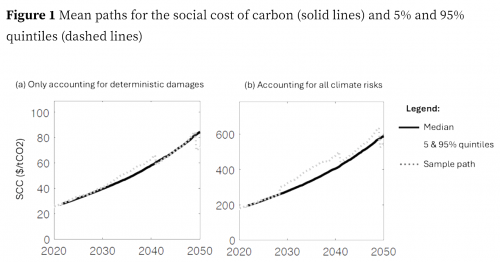New study updates the “social cost of carbon”
New estimate of the Social Cost of Carbon supports rising carbon taxes in Forums in Nerd Corner
| Jonathan Marshall |
A new paper by three distinguished European economists offers a simple and intuitive method for estimating the “social cost of carbon” (see this thread) in place of more complex and challenging mathematical approaches. It focuses on the impacts of climate change on economic productivity, recurring natural disasters, and the probability of climate tipping points.
Cutting to the chase, they derive estimates of the social cost of carbon that start around $182 per ton of carbon dioxide today, rising to nearly $600 per ton in 2050.

Here’s their explanation of what those results signify:
So, why does the SCC [social cost of carbon] matter so much? It’s not just a number—it’s a guidepost for policymakers making decisions about climate action. If the true cost of emitting carbon is significantly higher than previously thought, it means the benefits of reducing emissions outweigh the costs by a larger margin. In practical terms, this implies that stronger climate policies, including carbon taxes and regulations, are needed to mitigate the far-reaching consequences of global warming. . . .
If the cost of carbon emissions is as high as this new estimate suggests, there is a much stronger case for implementing carbon taxes or other market-based policies that incentivise the reduction of CO2 emissions. Governments should thus consider adopting policies that align more closely with the updated SCC, such as higher carbon taxes, stricter regulations on emissions, and increased investment in renewable energy technologies. . .
Proposals for a carbon tax have gained traction in recent years, but the actual price at which CO2 emissions should be taxed remains a contentious issue. With the new estimate of $185 per ton, the economic justification for such a tax becomes much clearer. It’s not just an abstract number — it is a reflection of the growing costs of a warming planet. It should serve as a wake-up call for policymakers and citizens alike: we need to take more immediate and decisive action to avoid the worst impacts of global warming. In the end, higher carbon prices are a crucial step forward in making climate change a priority in the global policy conversation. With a clearer understanding of the true costs of carbon emissions, the world has a better chance of avoiding the worst outcomes and building a more sustainable future.

